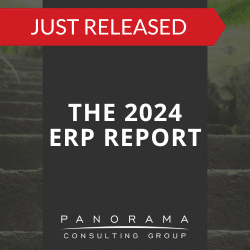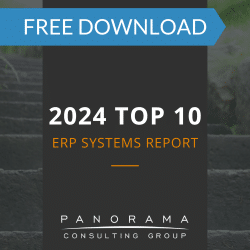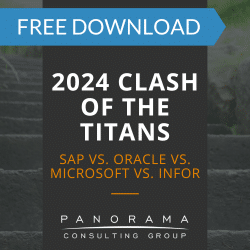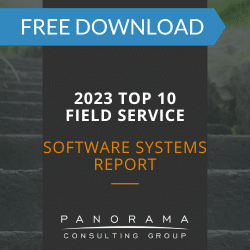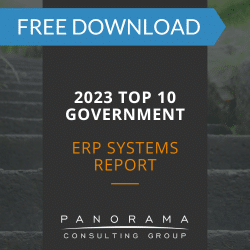If the kick-off of your ERP implementation is on the horizon, it’s understandable to be eager to get started. Chances are, you’ve been wanting to replace your legacy systems for quite some time.
However, before you take the next step, it’s important to ensure you have a solid foundation. By asking the right questions and taking the time to find the answers, you can set your organization up for long-term ERP implementation success.
Today, we’re sharing a few of the top ERP implementation questions to ask before project kick-off. Ideally, you will have asked yourself these questions long ago, but it doesn’t hurt to ask them again as a “gut check” between selection and implementation.
9 Questions to Ask Before Project Kick-Off
1. Have We Established an ERP Project Team?
When it comes to an organization-wide project, you need your best and brightest at the helm. This includes executives, managers, and department leads.
Keep in mind that these internal resources will have a hard time dedicating adequate time to the project. Backfilling and creative scheduling are necessary if you want to ensure a fully-committed project team.
In addition to evaluating your internal ERP project team, you should be using this time to ensure you have the right external resources. ERP consultants, for example, are essential when it comes to following best practices and lessons learned from successful implementations.
ERP Selection Guide
This ERP Selection Guide will help you select technology that will support your organization for at least the next ten years.
2. Do We Have a Project Charter?
An organization chart, or project charter, is a great way to define what each person on the team will do, who they will report to, and what parts of the project they will manage. This way, there’s no miscommunication regarding roles or reporting structures.
Key roles to plan for might include:
- ERP project manager
- Core project team members
- Functional leads
- Technical leads
- Business process reengineering leads
- Organizational change managers
If you’re ready to check this item off your list, take a moment to look at it one more time with the overall project scope in mind. You may find you need to add a few additional roles.
3. What is the Total Cost of Ownership?
Total cost of ownership (TCO) includes the software purchase price, as well as any costs associated with its implementation and operation.
While it’s easy to focus on the costs of the technical implementation alone, remember that it’s only a part of the puzzle. In most cases, there will be hidden costs that aren’t immediately obvious. Be sure to account for any peripheral cost elements, such as:
- ERP data migration costs
- Risk management costs
- System testing/quality assurance costs
- Downtime and outage costs
- Change management costs
These are only a few of the elements to factor into your ERP TCO. Understanding your long-term resource and budget needs is critical to making sure you have the financial bandwidth to move forward.
4. Do We Have a Business Case?
There should be solid, business-related reasons for the project that align with your organizational goals. Further, these benefits should outweigh the project costs.
If you’re not sure if you’re on the right track in this regard, you need an ERP business case. Even if you already have executive buy-in, it’s still worth developing a business case as you can use it to measure KPIs throughout the project.
5. What is the Implementation Plan?
The ERP project plan you received from your ERP vendor or systems integrator may cover the basic activities necessary to get the system up and running. However, there are several core activities that typically aren’t included in these basic plans. A few of them include:
- Organizational change management
- Data migration
- Conference room pilot testing
Are you missing these activities? If so, an ERP consultant, like Panorama, can analyze every aspect of your vendor’s project plan and help you build a new one based on this framework.
6. What Organizational Change Management Strategies Will We Use During Implementation?
In your quest to optimize the technical side of your project, you may neglect the people side. This component is essential because if your entire workforce isn’t on board, the investment could fail to yield the return you expect.
Focusing on organizational change management keeps your workforce engaged throughout the project. Change management considers how each process improvement and workflow configuration might impact individual employees. Then, the focus becomes mitigating any resistance that might occur.
The methodology you follow when mitigating change resistance could be the difference between ERP failure and success, so make sure you’re planning to use the right strategy.
7. What Project Governance and Controls are in Place?
Your project plan should clearly define the cornerstones that will guide each decision you make. For example, what factors will you consider when deciding whether to handle an issue internally or escalate it to your executive steering committee?
The plan also should clearly delineate who the core decision-makers are, and how they will exert their power and influence throughout each stage of the project.
8. What Stage Gates or Milestones Will We Use to Evaluate Progress?
Instead of pushing blindly ahead in an ERP project, we recommend establishing pre-set times to step back and evaluate the progress you’re making. This way, it’s easier to see where you might have veered off track, and what corrective actions you can take before problems begin to snowball.
While your project’s deadline might loom in the distance, it’s more important to do things right than on time – at least in the long run.
9. How Will We Define Success?
Success is a construct that looks different for every company.
Some organizations might deem their project successful if their workforce has stopped relying on spreadsheets for reporting. Others might have a specific ROI figure they want to hit. Then, there are companies that want to position their company for growth and are using ERP software to help them get there.
Regardless of your goals, they need to be quantifiable and in writing. If you reach the implementation stage and find that your goals aren’t clearly defined, it’s time to involve executives and stakeholders from across the organization, so you can reach business-IT alignment.
In addition to the major “win” that you’ll achieve at the project’s go-live date, you should set smaller, milestone-specific wins that can help encourage everyone along the way. Then, when you meet a goal, celebrate it! This boosts morale and gives everyone motivation to stay the course.
Catalyze Conversation by Knowing the Right ERP Implementation Questions to Ask
When you know the right ERP implementation questions to ask, you can engage your team in discussions about important topics that require buy-in, support, and alignment.
Our ERP software consultants can help you work through this checklist after ERP selection to make sure you’re prepared for the implementation phase. For information about our project auditing or implementation services, request a free consultation below.







